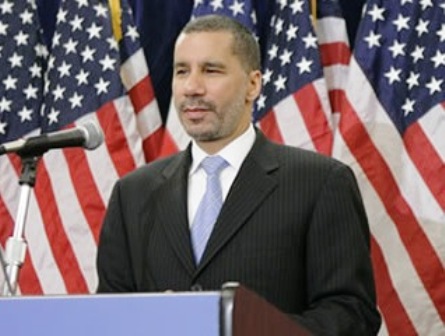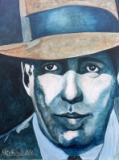Judges
The first black judge to have been appointed by the president to the federal bench was William Henry Hastie, whom Franklin Delano Roosevelt named as a district court judge for the U.S. Virgin Islands in 1937.

David Paterson served as the 55th Governor of New York, from 2008 to 2010. During his tenure he was the first governor of New York of African American heritage and also the second legally blind governor of any U.S. state. David Paterson had also been the Senator for New York and was Lt. Governor under Eliot Spitzer.
Born David Alexander Paterson on May 20th, 1954, in Brooklyn, New York, to labor law attorney Basil Paterson and homemaker, Portia Paterson. His family is steeped in political history, Basil was the first African-American Secretary of State in New York and the first African-American Vice-Chair of the National Democratic Party. His paternal grandmother also worked for a brief time in the political arena as a secretary to civil rights activist, Marcus Garvey.
The first of two sons, David was legally blind from birth, with only partial sight in his right eye. When their son was denied the opportunity to attend classes with sighted students in his hometown, Paterson's family moved to Hempstead, N.Y., so that he could participate in a mainstream classroom. An excellent student, Paterson graduated from high school in three years.
David Paterson received a BA in history from Columbia University in 1977 and a law degree from Hofstra Law School in 1983. After law school, he went to work for the Queens District Attorney's Office, but did not pass the New York bar examination, and did not become an Attorney at law. He attributed his failing the New York bar to insufficient accommodation for his visual impairment, and has since advocated for changes in bar exam procedures.
In 1985, David Paterson was elected to the New York State Senate, representing the 30th State Senate District, which encompasses Harlem, East Harlem, and the Upper West Side neighborhoods of Manhattan. It is the same district his father had represented. David Paterson has set milestones in history throughout his career. At the age of 31, David Paterson became the youngest state senator in New York's history. In 2002, David Paterson was elected Democratic leader of the New York State Senate, the first nonwhite legislative leader in New York's history. When asked by the New York Amsterdam News about life lessons he had learned, Paterson replied, "You never get to any level of leadership where your race is not a factor." He continued, "You don't want to be the first; you want to be the first of many."
Paterson gained national attention in the 1990s because of his efforts to preserve an African-American burial ground that was discovered at the excavation site for construction of a new federal building in New York City . He worked to secure federal funding for the project and said in 1997 that "through the discovery of the African-American Burial Grounds, our history has at last come to the surface for all of us to know and respect."
David Paterson was selected by New York Attorney General Eliot Spitzer as his running mate for the Governor's office in 2006. The news stunned the New York political world, as the Democratic minority was poised to possibly take over the state legislature. Paterson would trade a possible powerful Senate Majority Leader position for the largely ceremonial Lieutenant Governor post.
The Spitzer-Paterson ticket won a landslide victory in the election, with 69% of the vote. It was the largest margin of victory in a gubernatorial race in New York history, and the second-largest for any statewide race in New York history. In late December 2006, shortly before being sworn in as lieutenant governor, Paterson said that if he ever succeeded Spitzer as governor, he and Nelson A. Rockefeller would have something besides the governorship in common: great difficulty in reading. Rockefeller was dyslexic, which Paterson compared to his blindness. During his time as Lieutenant Governor, Paterson also served as an adjunct professor at Columbia University's School for International and Public Affairs.
A year later, New York Governor Eliot Spitzer became embroiled in a national prostitution scandal. After Spitzer's resignation in March of 2008, Paterson filled the former governor's position. The appointment made Paterson New York's first African-American Governor.
David Paterson now serves as a part of of the Democratic National Committee and as a house part of of the Democratic Legislative Campaign Committee. In further to his domestic work, the administrator is an outspoken disciple for the American Foundation for the Blind, and an zealous runner. Paterson finished the New York City Marathon upon Nov 7th, 1999, and now serves as a Member of the Board of the Achilles Track Club.
Don't miss a single page. Find everything you need on our complete sitemap directory.
Listen or read the top speeches from African Americans. Read more
Read about the great African Americans who fought in wars. Read more
African Americans invented many of the things we use today. Read more
Thin jazz, think art, think of great actors and find them here. Read more
Follow the history of Black Americans from slave ships to the presidency. Read more
Olympic winners, MVPS of every sport, and people who broke the color barrier. Read more
These men and women risked and sometimes lost their life to fight for the cause. Read more
Meet the people who worked to change the system from the inside. Read more

Visit my RedBubble page and use Michael Arnold Art to create greeting cards, T-shirts, mugs, and more.

The variety and impressive numbers of mammals, birds and marine wildlife in Alaska draw visitors from all over the world. For some travelers, Alaska is wilderness, at least compared to what they may know from back home. The pristine wilderness of Alaska is, perhaps, the last vestige of thriving populations of North American wildlife. Where else can you see polar bears, bald eagles, blue and humpbacked whales, gray wolves, grizzly bears, orcas, lynx, moose, and hundreds of other rare and endangered species in their original and undisturbed natural habitats?

Enjoy our website filled with original signed acrylic paintings by award winning Artist Michael Arnold. Located in Citrus County Florida, Michael Arnold is a the editor at the Citrus County Chronicle. When he's not busy being an editor, he is an avid artist who enjoys painting in a variety of styles. We hope you take the time to click on each image to see a larger view and to learn what the artist, Michael Arnold has to say about his paintings.

As dog owners and people who care deeply for animals and wildlife, we wanted our Dog Encyclopedia to be a website that could empower pet owners to create the most positive, loving environment for their dogs. Dog Encyclopedia realizes that owning a dog is like adding a new member to your family.

Floridian Nature has everything your are looking for in Florida nature. The wildlife of Florida is rich and varied, yet most of us are familiar with only a dozen or so species: the "well known endangered species such as manatees and panthers; those, like raccoons and squirrels, that have adapted to urban environments; the frightening alligators and black bears; and those like the armadillo who can't seem to cross the road. Yet they are just a few of the many animal species found in Florida.
